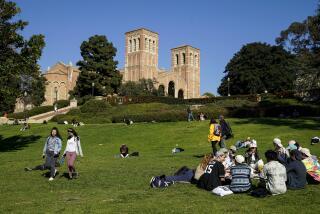State Minimum Wage Gets a Raise
Gov. Arnold Schwarzenegger ended three years of tussling with Democrats over the minimum wage by signing a bill on Tuesday that will raise the earnings of the state’s 1 million lowest-paid workers by $1.25 over the next 15 months.
On Jan. 1, California’s hourly minimum wage -- now $6.75 -- will become $7.50. And a year later, it goes up to $8.
“Raising the minimum wage is something I have wanted to do for a long time, and I am happy that this year, we have the right bill and the powerhouse economy we need to get this job done,” Schwarzenegger said at a signing ceremony in Los Angeles.
California’s minimum wage, now the eighth-highest in the nation, will jump to fourth place in 2007 and first in 2008. Annual full-time pay will hit $16,640 and cost employers an additional $2.6 billion a year when the new wage is fully in place.
“Thank God, this is going to help a lot,” said Eder Barrios, 34, who supports his family of five with the minimum wage he earns selling clothes in a small shop in downtown Los Angeles. “This can help us get a bigger apartment and is going to improve the quality of our lives.”
The jump in the minimum wage is the first since 2002, when the administration of then-Gov. Gray Davis approved an 8% increase.
But Schwarzenegger, who replaced Davis in a recall election the next year, has been less friendly toward raising the minimum wage, until now.
In 2004, he vetoed a proposed raise, arguing that it would “create barriers to our economic recovery.” The next year, he axed another minimum wage bill by the Democrats that would have tied automatic annual raises to the cost of living.
But this year, the governor -- who is seeking reelection in November -- embraced an increase. He supported it as long as it didn’t call for automatic annual increases based on the cost-of-living index.
Labor leaders balked and continued to press for indexing. But they gave up on the idea at the end of the legislative session and grabbed the chance to give workers a raise.
On Tuesday, Schwarzenegger’s Democratic opponent State Treasurer Phil Angelides said he supported the bill but would back automatic annual cost-of-living increases next year, if elected.
“I will stand up for hardworking families, not special interests,” Angelides said. He vowed to protect minimum wage earners from being “pushed into poverty by inflation.”
Labor leaders also were not entirely pleased Tuesday.
“It took three years and a reelection campaign to convince Gov. Schwarzenegger that $6.75 an hour is not enough to get by in California,” said Art Pulaski, secretary-treasurer of the California Labor Federation. Pulaski vowed to push for indexing, which has been adopted by Oregon and Washington, next year.
Though a few business groups supported the increase, they uniformly opposed yearly automatic pay raises.
Both measures would fuel inflation and payroll costs and force some employers to cut back on the number of people they hire, said the California Chamber of Commerce.
Mike Flynn, director of legislative affairs for the Employment Policies Institute, a business-backed think tank in Washington, said California’s higher pay would “reduce the number of entry-level jobs” for young workers.
Even some of the tiny-business owners at the Mercado La Paloma near USC, who watched Schwarzenegger sign the bill, said they were worried that boosting the minimum wage could spur inflation.
“Every time the minimum wage goes up, everything else goes up too,” said Nimio Zepeda, who owns a burger restaurant at the Mercado. He’s been in business for two years but said he still struggles.
“We’re not going to have the money to pay our employees -- $1 makes a huge difference,” he said.
But raising the minimum wage by nearly a fifth of what it is now will make a big improvement in the lives of low-income adults, said Jean Ross, director of the California Budget Project, a policy group that studies conditions for poor and middle-class people.
U.S. Census Bureau statistics show that 82% of workers who earn within $1.25 of the minimum wage are not teenagers but adults between the ages of 20 and 64.
People earning the minimum wage won’t be the only ones being helped by the increase, said Rosalina Jimenez, 42, of Compton, who makes about $10 an hour as a janitor under a Service Employees International Union contract.
“We’re going to benefit too because the base for our pay is the minimum wage,” she said. “We’ll get a little bit more to pay our bills, for rent, food and clothes for my children when we negotiate our contract.”
More to Read
Get the L.A. Times Politics newsletter
Deeply reported insights into legislation, politics and policy from Sacramento, Washington and beyond. In your inbox three times per week.
You may occasionally receive promotional content from the Los Angeles Times.








